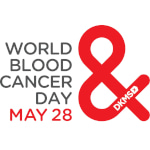World Blood Cancer Day Date in the current year: May 28, 2026
 World Blood Cancer Day (WBCD) is observed annually on May 28. It was established to draw attention to this deadly disease and to raise global awareness of the importance of blood stem cell donation in saving the lives of blood cancer patients.
World Blood Cancer Day (WBCD) is observed annually on May 28. It was established to draw attention to this deadly disease and to raise global awareness of the importance of blood stem cell donation in saving the lives of blood cancer patients.Blood cancers (hematological malignancies) are a group of cancers that affect the production and function of blood cells, typically originating in the bone marrow or lymphatic system. They are generally divided into three main types, depending on the parts of the blood and immune system that are affected:
- Leukemia starts in the bone marrow and affects white blood cells, leading to uncontrolled production of abnormal blood cells that enter the bloodstream.
- Lymphoma begins in the lymphatic system (lymph nodes, spleen, etc.) and affects lymphocytes, a type of white blood cell involved in immune defense.
- Myeloma begins in the plasma cells, another type of white blood cell, and disrupts the production of antibodies, typically staying within the bone marrow.
Blood cancers, like most other cancers, can be treated with chemotherapy, radiation therapy, or immunotherapy. However, there is another treatment for certain types of blood cancers called hematopoietic stem cell transplantation (HSCT): patients are given hematopoietic stem cells that give rise to healthy blood cells.
In the past, transplanted hematopoietic stem cells came from bone marrow, and HSCT was known as bone marrow transplantation. Today, however, 80% of the stem cells transplanted into blood cancer patients are taken directly from a donor’s bloodstream in a process similar to plasma donation, with a few additional steps.
Finding a matching HSCT donor is difficult because successful transplantation requires a close match of human leukocyte antigens (HLA), proteins found on the surface of most cells that help the immune system recognize which cells belong in the body, which is rare. Bone marrow/stem cell donor registries have been established to help find a match, but many potential donors are unaware of their existence or are reluctant to register.
World Blood Cancer Day was created in 2014 to raise awareness of donor registries and encourage people to register as potential blood stem cell donors. It was launched by DKMS, an international nonprofit organization dedicated to saving the lives of patients with blood cancers and other blood disorders through blood stem cell donations, and commemorates the organization’s founding anniversary.
DKMS is short for Deutsche Knochenmarkspenderdatei (German Bone Marrow Donor Center); the organization was originally founded in Germany by billionaire Peter Harf. Harf’s first wife, Mechtild, was diagnosed with leukemia and eventually needed an HSCT, but they couldn’t find a match in the family. In 1991, Harf teamed up with Mechtild’s hematologist, Gerhard Ehninger, to found DKMS and encourage Germans to register with the national bone marrow registry.
Mechtild eventually succumbed to the disease, but Harf and his family continued to build the organization and help people with blood cancers find matching donors. Today, DKMS is the largest stem cell donor registry in the world, with chapters in Chile, India, Poland, South Africa, the United Kingdom and the United States.
There are many ways to get involved with World Blood Cancer Day. You can register as a blood stem cell donor, donate to an organization that helps blood cancer patients, host a donor drive or fundraiser, and spread the word on social media using the hashtags #WorldBloodCancerDay, #BloodCancerDay, and #WBCD.
- Category
- International Observances
- Tags
- World Blood Cancer Day, international observances, awareness days, DKMS, blood stem cell transplantation, blood stem cell donor registry